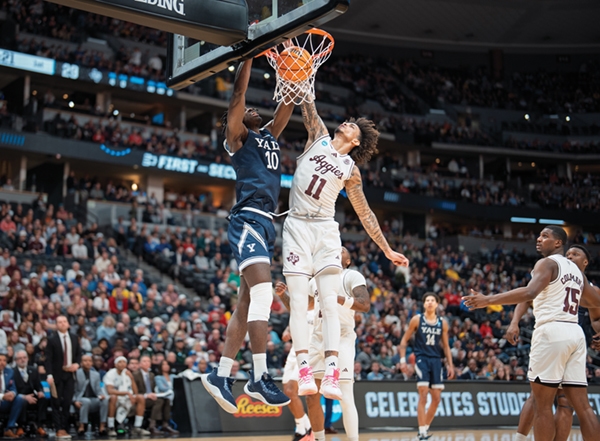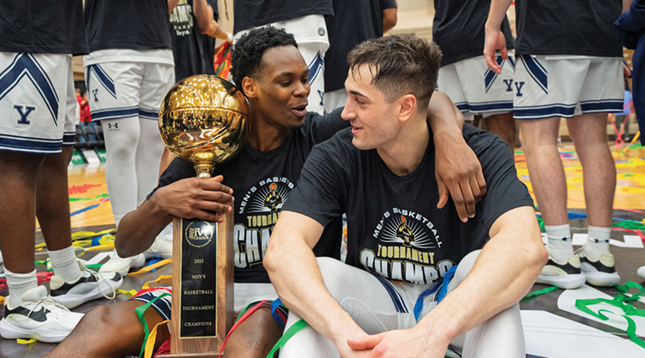
David Schamis ’95
Center Samson Aletan ’27 scores on Texas A&M at the NCAA Tournament in Denver.
View full image

David Schamis ’95
Center Samson Aletan ’27 scores on Texas A&M at the NCAA Tournament in Denver.
View full image

David Schamis ’95
All-Ivy standouts Bez Mbeng ’25 and John Poulakidas ’25 celebrate after winning the Ivy League Tournament.
View full image

David Schamis ’95
All-Ivy standouts Bez Mbeng ’25 and John Poulakidas ’25 celebrate after winning the Ivy League Tournament.
View full image
Coming off last year’s Ivy title and March Madness upset over Auburn, the expectations were high for Yale men’s basketball this year. So much so that their celebration of another league championship, their third in four years, seemed a bit muted, as if it were just another day in the office. If anything, the pressure had been lifted. “This year, we won a championship and there wasn’t much celebration at all,” said head coach James Jones after winning the Ivy League Tournament in Providence. “It’s just become an expectation of what you are and what you think you should do.”
Headed to the NCAA Tournament for the fifth time in eight seasons (or ten years: there was no tournament in 2020 because of Covid, and the Ivy League sat out the following season for the same reason), jubilation was replaced by some well-deserved confidence. “There’s not a team that we’re going to play that’s going to be happy to play us,” said Jones, in his 26th year leading the Bulldogs. “‘Oh, we got Yale!’ Nuh-uh. They’re not gonna be happy. They’re not going to be happy they’re playing us.”
Yale returned to March Madness as a result of an Ivy League regular season that was nearly perfect, led by seniors John Poulakidas ’25, a first-team selection who led the Ivy in scoring, and floor general Bez Mbeng ’25, named Ivy League Player of the Year while picking up his third Defensive Player of the Year award. Mbeng also had three games with triple-doubles (double-digit points, rebounds, and assists), enough to lead the nation. The Bulldogs were a perfect 11–0 at home and at one point won 13 straight games, the longest streak in the country at the time.
A late-season loss to Harvard was perhaps a necessary gut check. “It recentered our focus a little bit. We wanted to be the first team in Yale basketball history to go undefeated,” said Poulakidas, referring to the Ivy League season, where the Bulldogs finished 13–1. “We still had all the confidence in the world in what we had accomplished to that point, and we knew we had to get back to the fundamentals.
We had a lot of close-out drills and a lot of defensive slide drills.” He added, grinning: “So, thank you Coach Jones for making us get in a stance and call ‘ball’ on close-outs.”
Back on track, Yale racked up two gritty wins at the Ivy League Tournament, beating Princeton and then Cornell in two close contests to earn its March Madness bid. Seeded 13th, the Bulldogs were matched against 4th-seeded Texas A&M in Denver. Since the Ivy team in the tournament had pulled upsets in the previous two years, Yale was a popular bracket pick, though still very much an underdog. “People don’t think we’re any good. Nobody gives you any credit for being any good,” said Jones the day before their first-round game. “If you read the name on the chest and you see an Ivy League school, you’re supposed to be X, Y, or Z, but it’s a misnomer. It’s not reality.”
In Denver, Yale had all the college pomp in place, with the Yale Precision Marching Band and Yale Cheerleading making the trip, along with President Maurie McInnis ’96PhD at the front of a significant crowd of Eli fans. There, the Bulldogs took on a physical Aggies team that led the country in offensive rebounds. The team’s performance started spirited, but also a bit rushed, with six turnovers in the first eight minutes and cold shooting in the first half, along with foul trouble early for Mbeng and big center Samson Aletan ’27. The Aggies quickly jumped out to a ten-point lead, and the margin hovered near there for the large majority of the game. Though they kept the rebounding game even through the first 20 minutes, Yale trailed by 11 at the half.
In the final minutes, the Bulldogs did make a play for an upset. Nick Townsend ’26 made a short jumper with 8:36 to play to cut the Aggie lead to six, energizing the crowd and forcing the Aggies to call timeout, a situation not unlike last year’s stunner versus Auburn. But in the following three minutes, Texas A&M broke off a 9–0 run that built an insurmountable lead. Yale would fall by a final score of 80–71, despite 23 points for Poulakidas and a near-double-double for Mbeng. Remarkably, it was only Yale’s second loss since the new year.
As reality set in that the run was coming to an end for the most successful class in Yale basketball history, the emotions were raw. In the final moments, Mbeng fouled out and shuffled to the bench for the last time. He sat down, shook his head, and, staring into the middle distance, heaved an emphatic sigh. He ended his career as Yale’s all-time steals leader, ranked second in assists.
At the postgame press conference, tears flowed as the two seniors reflected on Bulldog brotherhood. “Me and John came in our freshman year, and the bond was just crazy. We saw how much each of us loved the game, and we just put so much time in,” said Mbeng, choked by emotion and trailing off. This time, Poulakidas stepped in with the assist, picking up for his teammate. “It’s just a camaraderie. We built a brotherhood here,” he continued, barely able to get the words out, his eyes sparkling against the bright lights. “Thinking that . . . thinking that this is the last game I’m going to put a Yale jersey on with Bez Mbeng just breaks my heart. It just breaks my heart.”
Jones, ever the stoic, summed up the moving, bittersweet moment. “There are few people that put as much time and effort into their craft, and care about each other and their teammates as much as these two guys do,” he said. “They came into a winning program and helped bring us to another level.” In an era where fewer college players stick together for a full four years, it was a special reminder of the heights achievable through a deep bond forged as teammates. Happy, golden, bygone days indeed.
 loading
loading